EAC and Health
The EAC Secretariat is mandated to offer advisory and coordination support to its Partner States, Burundi, Democratic Republic of Congo, Kenya, Rwanda, South Sudan, Tanzania and Uganda in the prevention of and response to outbreaks of infectious diseases of public health concern. In the past, the EAC region has experienced numerous outbreaks of infectious diseases. Most of the pathogens are endemic in the region and pose a constant health risk. The COVID-19 pandemic clearly showed how quickly new pathogens that could emerge anywhere in our globalised world can spread to the region and jeopardise public health, economic stability and the livelihoods of citizens. The spread of infectious diseases is promoted by migration and transboundary trade, which is facilitated by the EAC common market, by tourism and by the impacts of climate change. To prevent and combat outbreaks of infectious diseases of public health concern, Partner States need to be prepared.
The German Government supports this EAC Sector under Core Area 2 of EAC-German cooperation as defined by BMZ 2030 – “Health, Social Protection and Population Policy” in the Intervention Area of “Health, Pandemics and One Health”. The cooperation directly contributes to implement two of the eight priority areas defined by the 6th EAC Development Strategy, namely “Strengthening Productive and Social Sectors” and “Awareness Creation”. The BMZ 2030 reform strategy focuses on a new quality of cooperation. More information on BMZ 2030 can be found here.

Health
EAC-Germany Support

Pandemic Preparedness and One Health
The Ebola epidemic in West Africa revealed major gaps that accelerated the rapid spread of the disease. Among them were the lack of rapid, clear and efficient communication tailored to the population with its specific cultural and social backgrounds, insufficient laboratory capacities to respond to disease outbreaks, and the lack of close cooperation across sectors and between disciplines. The latter is especially important as more than two thirds of infectious diseases of epidemic potential are zoonoses, which can be transmitted between animals and humans as experienced with the COVID-19 pandemic and its severe impact on human health, the economy and society. To this end, a multisectoral and multidisciplinary approach, regional strategies and skills are needed that are lacking in the EAC. Since 2016/17, EAC and GIZ and KfW have cooperated in the health sector in the area of pandemic preparedness. When disease outbreaks with epidemic potential are detected and diagnosed early on and measures are taken more rapidly, everyone living in the EAC Partner States benefits. In addition, functionable supply chains are key to ensuring access to medicines, vaccines and health products. Often, the poor rural population is hardest hit by the impacts of epidemics, since they lack the knowledge and financial means to recognise health risks and protect themselves effectively. Many times, they have only limited access to health services and effective treatments and thus benefit particularly from the support measures of the EAC Secretariat.
Projects:
PanPrep (GIZ)
Objective: The health of the people in the EAC is improved.
Approach: PanPrep involves stakeholders from the EAC Partner States in all its activities. Capacity development measures are designed to ensure that the acquired skills promote the countries’ systems and cross-border cooperation in the long term. The regional approach aims to create structures and capacities relevant for all EAC Partner States to facilitate a uniform, effective, responsible and balanced approach in pandemic preparedness at regional and national government levels.
The project builds capacities and competences at institutional, individual and community level. It supports mainstreaming of the One Health approach in the EAC region and institutionalises risk and crisis communication at the EAC Secretariat with the objective of empowering citizens to take informed decisions related to existing or emerging risks. The application of the One Health approach facilitates a common response across sectors and disciplines which contributes to utilising synergies and accommodating different legitimate interests to ease the social and economic effects of events of public health concern.
PanPrep supports the development of political framework documents and of Standard Operating Procedures to facilitate their implementation. The project assesses regional and national response capacities and the status of implementation of the International Health Regulations in cross-border simulation exercises and promotes cross-border response activities and harmonisation of national contingency plans and capacities with regional strategies. The project facilitates the Africa-wide exchange of experiences in pandemic prevention and control and the development
Find more information on PanPrep here.
GP PPOH (GIZ)
Objective: The regional One Health Strategy to support the institutionalization of One Health in the EAC is implemented.
Approach: The interventions identified as part of the EAC and GP PPOH cooperation are interconnected and fall under the priorities of the EAC One Health Strategy, which is in its final stage of development. In this context, the GP PPOH supports the following measures:
- Establishing of a fully functional One Health Coordination Office at the EAC Secretariat.
- Capacity development in the area of pandemic prevention and response with a One Health approach.
- Mainstreaming and strengthening One Health in the prevention and control of transboundary animal and zoonotic diseases as well as food safety.
- Supporting operationalization of a regional rapidly deployable expert pool to respond to public health emergencies.
Gender aspects will be considered, and digital tools applied as required across programme interventions to ensure maximum effectiveness. Inequalities between EAC Partner States will be addressed throughout programme implementation, following the EAC Secretariat’s participatory approach by engaging experts from all Partner States and promoting implementation in weaker Partner States. All activities will be closely aligned with the EAC-Germany PanPrep Project. GP PPOH is funded by the German Federal Ministry for Economic Cooperation and Development (BMZ).
Find more information on GP PPOH here.
Mobile Labs Project (KfW)
Objective: The EAC Mobile Labs project aims to strengthen diagnostic laboratory capacities in the EAC Partner States. This will help to improve the response to disease outbreaks in the region, with the ultimate objective of preventing epidemics and pandemics.
Approach: The project sets is focus on procuring and operating fully equipped mobile laboratory units. These can be deployed rapidly to areas of suspected outbreaks, in order to reduce the time to detect infectious diseases. Investments include:
- Nine mobile laboratories were procured and handed over to Partner States and have since been deployed for COVID-19-testing, as well as for field missions for other diseases.
- Personnel of the Partner States’ National Public Health Laboratories were trained extensively for operating the labs.
- The second phase follows a similar approach, with the procurement of container-based laboratories focusing on bacterial (rather than exclusively viral) pathogens. This will strengthen antimicrobial surveillance capacities.
The project is financed by the German government through KfW in the context of the EAC-German cooperation in the health sector.
EAC RCE-VIHSCM (KfW)
Objective: Helping to solve performance challenges in supply chain management for vaccines and other health commodities through the generation of knowledge and its translation into practice, policy and research. Ultimately, the activities are meant to contribute to improving access to quality health products for the population of the entire East African Community.
Approach: The RCE-VIHSCM is one of the EAC’s Regional Centers of Excellence in Higher Medical Education and Research, based at the University of Rwanda in Kigali. Through a two-phase grant financed by the German Government through KfW, the RCE-VIHSCM:
- Offers scholarships for Master’s Students from across the EAC Partner States, as well as professional development courses for practitioners along the health supply chain.
- Develops and implements courses, trainings and research activities in order to disseminate innovation in health supply chain management. This will strengthen capacities across a wide range of areas such as effective vaccines management, quality assurance and cold-chain management.
- Has established numerous partnerships with academic institutions, the private sector as well as international organisations. It is on track to further expand its training menu to respond to the skills needs of pharmaceutical and vaccine manufacturers and regulatory bodies.
- Strives to develop and implement a Pooled Procurement Mechanism for the EAC and will act as the Pooled Procurement Secretariat jointly with EAC Secretariat.